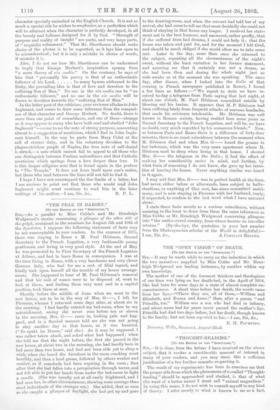THE PEAK IN DARIEN."
(To THE EDITOR OF THE " EPEOTATOR."3 SIO,—As a parallel to Miss Cobbe's and Mr. Hensleigh Wedgwood's stories concerning a glimpse of the other side of the gulph, contained in the numbers for August 5th and 19th of the Spectator, I suppose the following statement of facts may be not unacceptable to your readers. In the summer of 1875, there was staying in Rome a. M. Paul H6risson, Second Secretary to the French Legation, a very fashionable young gentleman, and living in very good style. At the end of May he was promoted to be First Secretary of the French Legation at Athens, and had to leave Rome in consequence. I was at the time living in Rome, with a very handsome and very clever German lady, who had for me a sort of filial regard, and kindly took upon herself all the trouble of my house arrange- ments. She happened to hear of M. Paul H6risson's removal and that his suit of rooms were to be disposed of, went to look at them, and finding them very neat and in a capital position, took them at once. Shortly before the middle of June when we went to the new house, not to be in the way of Mrs. G--, I left for Florence, whence I returned some days after, at about six in the morning. I had hardly entered my bed-room, when to my astonishment, seeing she never rose before ten or eleven in the morning, Mrs. G— came in, looking pale and hag- gard, and in a flurried manner told me she was not going to stay another day in that house, as it was haunted. (" Es spukt im Hamm," said she.) As it may be supposed, I was rather taken aback, and asked what had happened ; when she told me that the night before, the first she passed in the new house, at about two in the morning, she had hardly been in bed more than two hours, and had not been able yet to sleep a wink, when she heard the furniture in the room cracking most horribly, and then a loud groan, followed by others weaker and weaker, as if somebody had been expiring in the room ; that after that she had fallen into a perspiration through terror, and not felt able to put her hands from under the bed-cover to light a candle. (She was usually not at all easily frightened, and I had seen her, in other circumstances, showing more courage than most individuals of the stronger sex.) She added, that as soon as she caught a glimpse of daylight, she had got up and gone to the drawing-room, and when the servant had told her of my arrival, she had come to tell me that most decidedly she could not think of staying in that house any longer. I received her state- ment not in the best humour, and answered, rather gruffly, that if she suffered from bad dreams, I could not help it ; that the house was taken and paid for, and for the moment I felt tired, and should be much obliged if she would allow me to take some rest. Later in the day, more than once she returned to the subject, repeating all the circumstances of the night's event, without the least variation in her former statement, and assuring me that it certainly was not a dream, as she had been then and during the whole night just as wide awake as at the moment she was speaking. The same day, after dinner, when I looked into the Italie of that evening (a French newspaper published in Rome), I found a few lines as follows :—" We regret to state we have re- ceived to-day a telegram from Paris saying that last night, at about one o'clock, M. Paul 116risson committed suicide by blowing out his brains. It appears that M. P. H6risson had been suffering lately from frequent attacks of nervous headache, that made his existence intolerable. Mr. }Meissen was well known in Roman society, having resided here some years as Second Secretary to the French Legation, and will be, we have no doubt, very much regretted by his numerous friends." Now, as between Paris and Rome there is a difference of forty-four minutes, there is an exact coincidence between the moment when M. Herisson died and when Mrs. G— heard the groans in her bed-room, which was the very same apartment where M. Herisson used to sleep when living in that house. I showed Mrs. G— the telegram in the Italie ; it had the effect of making her considerably easier in mind, and further, by what train of reasoning I do not know, she gave up her inten- tion of leaving the house. Never anything similar was heard in. it again.
I may add that Mrs. G— was in perfect health at the time, had never, either before or afterwards, been subject to hallu- cinations, or anything of that sort, has since committed matri- mony, and is now staying in Florence with her husband, ready, if requested, to confirm to the last word what I have narrated above.
I state these facts merely as a curious coincidence, without meaning in the least to draw from them the same inferences as Miss Cobbe or Mr. Hensleigh Wedgwood concerning glimpses into "the undiscovered country, from whose bourne no traveller returns." (By-the-bye, the quotation in your last number from the Shakespearian scholar of the World is delightful.)—






























 Previous page
Previous page